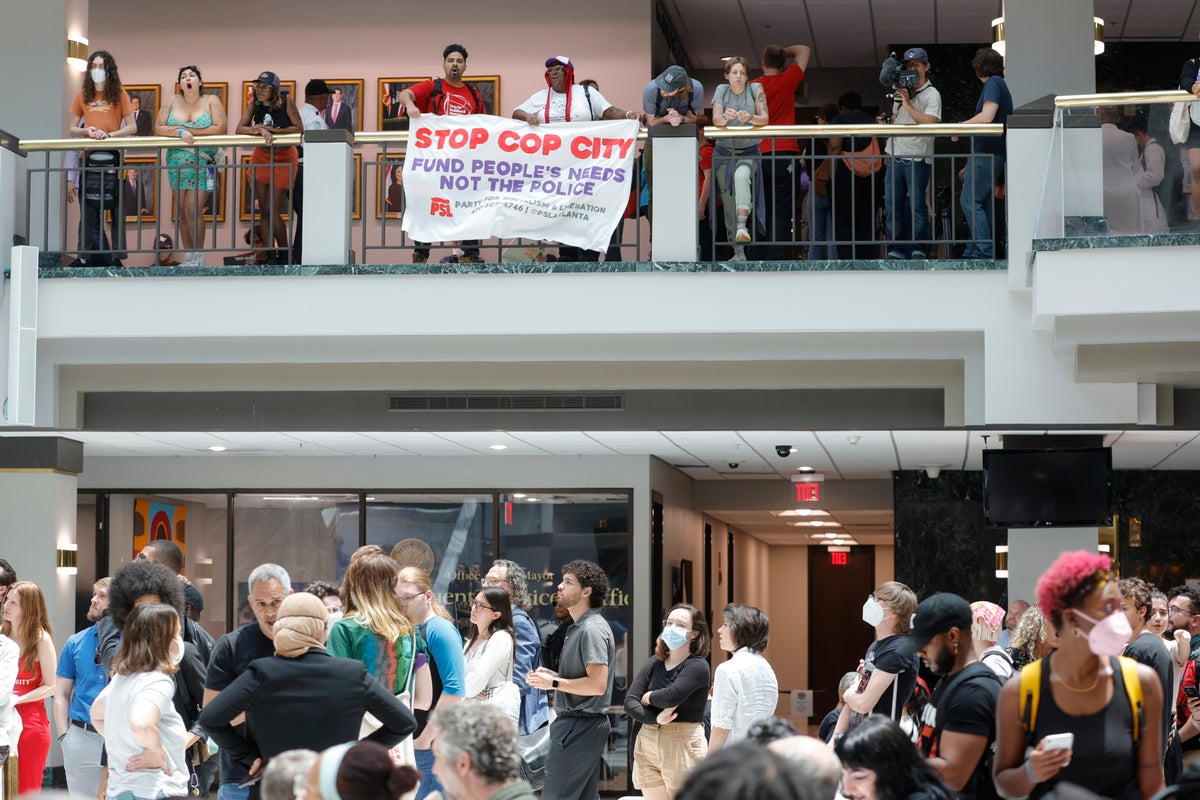
Hundreds of demonstrators rallied in and outside the Atlanta City Council on Monday as city officials were set to vote on whether to spend at least $31m in public funds to construct a controversial police training centre dubbed “Cop City.”
As The Independent has reported, many local residents and community groups argue that the Atlanta Public Safety Training Center, which will feature a firing range and a mock city for training exercises, will further military-style police violence towards people of colour.
"Today’s vote is about perpetuating militarized policing that will endanger the lives of our residents, our visitors, and put the Black people and Brown people in Atlanta at a heightened risk of police violence,” Gary Spencer of the NAACP Legal Defense Fund testified on Monday before the council.

Critics also say the construction project, backed by the private Atlanta Police Foundation and a variety of high-profile corporate donors, will take place in a rare preserved green space in the Atlanta area, violating environmental law by polluting local waterways, and and will continue the checkered history of a forest that has been the site of indigenous displacement and a prison labour farm.
“I don’t think any of us want anybody to die, anybody to have polluted water,” Mekko Chebon, a leader within the Muscogee people who originally inhabited the Weelaunee forest, told the council.
“We want the better way,” he added. “Today I ask that you stop, and that if at least if you never see another Muscogee person again, I’m standing right here.”
City officials argue the site is needed to improve on aging city training facilities for fire and police personnel.
Controversy has been swirling around the project since its proposal in 2021.
Most recently, the Atlanta Journal-Constitution reported that the project will cost the public vastly more than the roughly $30m of the $90m project that’s been touted by supporters of Cop City. Through decades of annual “lease-back” payments of $1.2m a year to the Atlanta Police Foundation, taxpayers could end up putting roughly $67m towards the centre.
“For nearly two years, the city has basically told one story, one narrative: that this would cost $30 million of taxpayer money and that $60 million would be donated by corporations,” Kamau Franklin, of Community Movement Builders, recently told the paper. “This is the narrative that they told us over and over and over again.”
City officials argue they haven’t been misleading, and that the lease payments are cheaper than current city payments on training facilities.
Last week, police arrested three organisers behind a nonprofit group that provides bail and legal support to arrested protesters, charging them with money laundering and charity fraud.
Bail fund organisers and civil rights groups have warned that the arrests mark a rapid and unconstitutional escalation of law enforcement retaliation against demonstrators involved with the “Stop Cop City” movement.
Over the last two years, activists involved in the movement have been arrested for terrorism charges, though an analysis of their arrest documents by Grist shows “none of those arrested and slapped with terrorism charges are accused of seriously injuring anyone” and most of the charges are based on the equivalent of misdemeanor trespassing.

In January, a multi-agency team of Georgia police fatally shot a forest protester named Manuel “Tortuguita” Esteban Paez Teran.
Police claim Teran fired on officers unprovoked.
No body camera footage of the encounter exists.
The official autopsy of Teran, who used they/them pronouns, found no evidence the individual fired on officers
In April, the DeKalb County Medical Examiner released its report on the activist’s death and found no gunpowder residue on Teran’s hands, an indicator used to show someone recently fired a gun. The probe did find that Teran was shot 57 times by police, with wounds to the body, hands, torso, legs, and head.
The DeKalb County Medical Examiner declined to draw the same conclusion as a private autopsy, which found the activist died with their hands raised, writing "there are too many variables with respect to movement of the decedent and the shooters to draw definitive conclusions concerning Mr. Teran’s body position."
Police maintain Teran fired first, and that a gun found in the slain activist’s possession matched bullet wounds on the wounded officers, according to the Georgia Bureau of Investigation.







